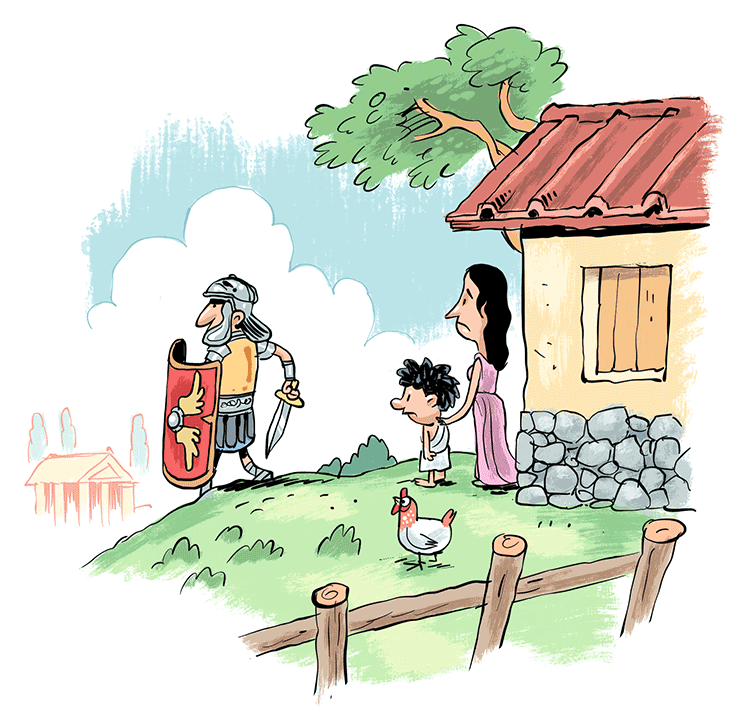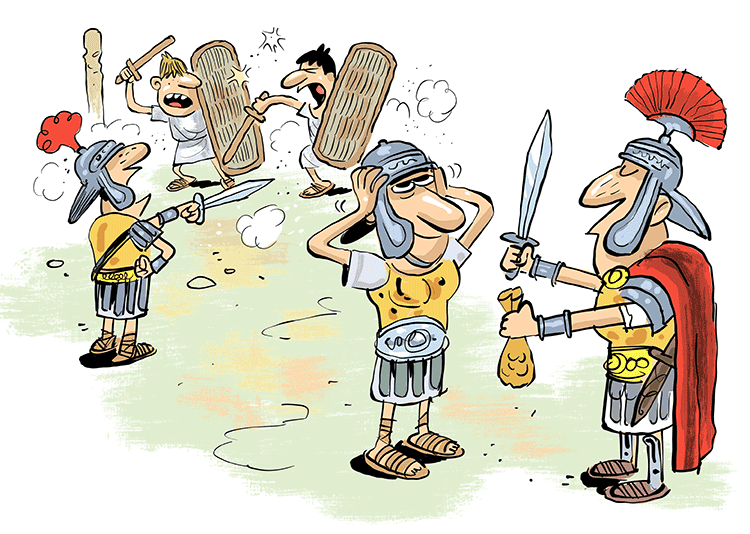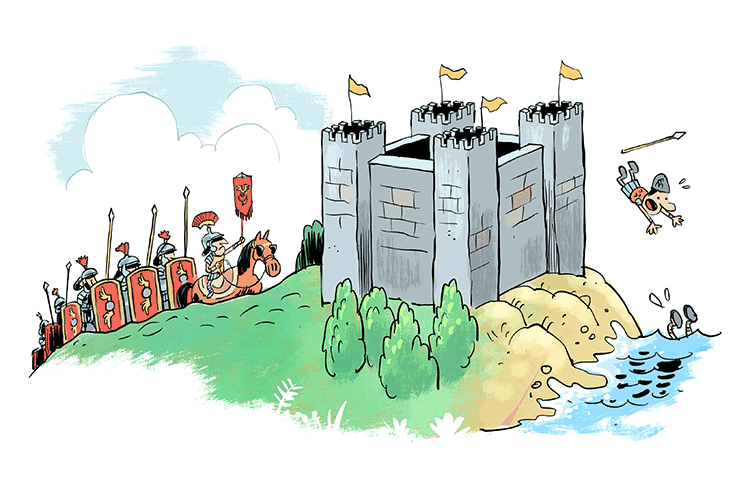As the Romans began moving further and further from Rome and claiming more territory as their own, they were met with considerable resistance. After all, if someone walked into your home and said “this is mine now” you might respond with “Yeah? It belongs to you and what army?”
Well, for the Romans, they had a pretty good answer to this question. The Roman military, starting in the late days of the Republic (second and third centuries BC) had gained a reputation across the ancient world as a force not to be messed with.
This made it possible for Rome to expand its sphere of influence across most of Europe, North Africa, and western Asia. But what was so special about the Roman army and the men who fought in it?

Military Service as a Duty
In the early days of Roman history (starting with its founding in the eighth century BC up until the early days of the republic in the fourth and fifth centuries) military service was the duty of all Roman citizens.
Every year, able bodied men who owned property were required to leave their homes and fight for Rome. They would be expected to equip themselves with weapons and armor, and when their campaign was over, they would return home and live normal lives, usually as farmers.
Why would they do this? For one, they had to. Skipping out on military service could lead to fines or other harsher punishments, not to mention dishonor. But there was also incentive for men to fight.
Doing so would push back nearby enemies, something property owners would be very interested in doing. And it could also make a man rich. The Romans didn’t just win a battle and leave. Instead, they would pillage and plunder vanquished towns for everything they had, bringing them, and the city of Rome, wealth and glory.
This type of military worked in the early days of Rome, but as the city expanded its influence, changes were needed to keep its military relevant.

The Rise of Professional Soldiers
By 107 BC, it was clear that Rome was not just a city. It had won military victories across the Mediterranean and had emerged as a regional superpower. In response, a Roman politician named Gaius Marius began implementing reforms to the military.
The biggest changes were to allow non-property owners to join the military. But, perhaps even more importantly, the Roman state would fund and equip these soldiers. Joining the military would bring a steady salary and also provide an opportunity to advance oneself socially.
This process continued throughout the Late Republic and allowed the Roman army to grow considerably. But it also made the army stronger. Since these men were professionals, they didn’t have anything else to do but to train and improve as soldiers.
No other society in the region had the ability to do this, which made it that much easier for Rome to expand its territorial claims.
Roman Legions
The Roman army was divided into groups known as legions. The professional soldiers who fought in them were known as legionnaires. Depending on the period of history, a Roman legion could have as many as 5,000 – 6,000 soldiers along with its own cavalry unit, people who fought on horseback.
A typical Roman legionnaire would be provided with weapons and armor. This usually included an iron or bronze breastplate, helmet, and sword along with shoes and a spear.
At its peak, the Roman army had somewhere around 350,000 soldiers in it. That sounds pretty big. But when we consider its task — to defend and protect an area stretching from Britain in the west to Syria in the east and containing around 60 million people — things become more complicated.
In addition to being highly-trained soldiers, Roman legions were also incredibly important to the rest of the empire. First, they were workers. When not fighting, they built many of the things that helped make Rome as powerful as it was, such as roads, aqueducts (to deliver water), bridges, and more.
They were also the provincial police. Once a territory was conquered, its population was expected to pay taxes. People often resisted, so the legionnaires would go out and make sure they paid.
Legionnaires as “Romanizers”
Lastly, Roman legionnaires played a key role in the cultural development of Rome. Once their term of service (usually 25 years) was up they were often given a plot of land in one of the provinces and allowed to live out their lives in peace.
As Romans lived so far from the city of Rome, this helped “Romanize” the area. Locals would be forced to learn Latin, or some version of it, and the presence of retired legionnaires helped legitimize the rule of provincial governors.
So, while a legionairre’s official job was a soldier, they often did much more for the empire.
Over time, however, Roman soldiers began to recognize this and exerted more and more power. If they didn’t like who was named emperor, they could oppose him and support someone else. And since they were the ones doing the fighting, it was often hard to stop them. Roman emperors would try to buy off these soldiers with bribes and other promises, but this only complicated things more.
In the end, power in Rome often fell to the one who had the most control over a vast and often independent army. And since these allegiances changed frequently, so too did the person claiming to be emperor.
Military General and Leaders
Because of the importance of the military, its leaders also held a considerably important position in Roman society.
During the days of the Republic, control of the army was given to the consuls. These two individuals were elected by the Senate and charged with carrying out some sort of campaign, usually to suppress a rebellion or conquer new lands. These individuals were generally considered to be the most powerful in the Roman republic.
However, generals and other military commanders could gain political prominence with success on the battlefield. Conquering enemies or defending against invasions led to lots of popular support back home and could dramatically alter the political situation.
The best example of this is the case of Julius Caesar. After conquering much of Gaul and Hispania (modern France and Spain) for the empire, he returned to Rome immensely popular.
Rome’s elite did not like this as Caesar was seen to be too much of a “man of the people.” Yet they couldn’t stop him and he was eventually named the first dictator of Rome and ushered in the age of the empire.
This story would play out again and again throughout Roman history. On several occasions (in the first, second, and third centuries) the death of an emperor led to crisis and civil war as different military commanders and politicians fought for control over Rome.
Eventually, the empire was split into two to accommodate these different actors, and this changed the course of Roman history forever.

The Roman Army: Better or Just Bigger and More Organized?
It’s hard to argue with the success of the Roman military. Over the course of a few hundred years, it managed to conquer more territory than any army before it and all but a few that came after it. But was it inherently better than the armies it faced? Or just bigger and more organized?
The answer is probably that by being bigger and more organized it became better.
Most of Rome’s foes were smaller, less-organized tribes, mostly Germanic, who posed a threat but who did not have what the Romans had: a full-time professional army.
In addition to the Legions, there were also the Auxiliares, which were smaller divisions placed within Roman territory that served as reserves to the Legions.
This made it next to impossible for anyone to seriously challenge Roman power during its time atop the ancient world. You didn’t want to pay taxes? Prepare to be invaded. Didn’t want to recognize the emperor? Prepare to be invaded. Want to be a part of something else? Prepare to be invaded.
On top of that, once defeated by the Romans, things did not usually go well for you. Execution was definitely on the table, as was slavery. And you can forget about keeping your things. These would all be stolen.
In the end, the sheer size of the Roman army, as well as its organization, made it the most feared in the land. This fear then made it possible for Rome to create an empire larger than any other that came before it.
Written by Matthew Jones
Illustrated by Jean Galvao
